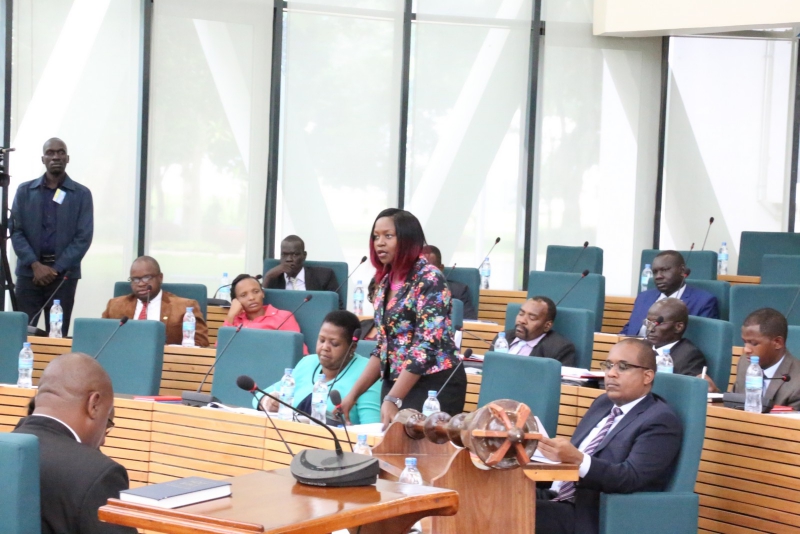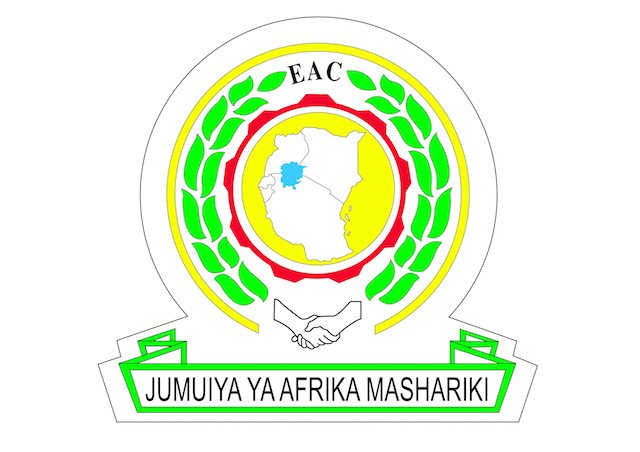
Posted in Press Release
East African Community Secretariat, Arusha, Tanzania, 23rd March, 2018:
Intra-African trade is extremely low and currently accounts for only 10% of all commerce on the continent, Uganda’s Prime Minister Rt. Hon. Dr. Ruhakana Ruganda has said.
Dr. Rugunda called for concerted efforts between African governments and the private sector to enable the continent attain its development objectives.
Dr. Rugunda said that doing business as blocs was increasingly becoming the norm as evidenced by the signing earlier this week in Kigali, Rwanda of the Continental Free Trade Agreement (CFTA) by the leaders of 44 African countries.
Dr. Rugunda said that the CFTA, which will come into force within six months, would increase prosperity for 1.2 billion Africans, adding that it was a true learning experience for businesses across the globe.
The Prime Minister was speaking during the official opening session of the East African Business Council (EABC) 20th anniversary celebrations in Nairobi, Kenya. The PM represented President Yoweri Museveni at the event.
Dr. Rugunda hailed EABC for striving to see to it that regional integration process is achieved with meaning and tangible results for the citizens of the East African Community (EAC).
“Since the inception of the EABC, there has been progress towards achieving the integration process through trade and policy reviews, tax harmonization, discussions on the Northern Corridor, stakeholder engagements to improve the free movement of goods and services within the region,” he said.
Dr. Rugunda noted that the region still faces many challenges along the route to full integration including the need for full harmonization of policies and laws.
“This is a process that is taking time for all Partner States but a lot of progress has been made in this direction. We have to keep the momentum,” said the PM.
In his remarks, Kenya’s Minister for Cooperatives, Trade and Industry, Mr. Adan Mohammed, who represented President Uhuru Kenyatta, said that the private sector in East Africa had also contributed to the challenges to intra-regional trade including non-tariff barriers to trade.
Mr. Mohammed said that the private sector had brought about NTBs by pushing their respective home governments to push for national interests as opposed to the regional integration agenda for the sake of preserving their markets.
He described the EAC as the most integrated regional economic bloc in terms of trade and infrastructure development, adding that the Community needs to stick together when negotiating trade agreements with other regional economic communities because there is strength in numbers.
Speaking at the event, Kenya’s Minister for EAC and Northern Corridor Development, Hon. Peter Munya, said the region faced a challenge in the implementation of agreed protocols.
“National laws need to be aligned to regional protocols. Partner States also need to push for law reforms back home. The other alternative is to pass overarching laws at the regional level to replace existing legislation. This has been done with success in the European Union,” said Hon. Munya.
Hon. Munya called for a review of the Common External Tariff and efforts to make the EAC Single Customs Territory work better, adding that the Community may need to establish a regional institution to make this possible.
He said that the region was currently a net importer of various commodities and advised that governments should prioritize industrialization. He said that Kenya had prioritized industrialization under its Big Four Agenda and particularly singled out the manufacture of apparels and local motor vehicle assembly.
EABC Chairman Jim Kabeho emphasized the importance of local content especially in huge infrastructure projects being undertaken by governments in the region.
“The local business sector should be allowed to participate in major projects including at the inception. All materials for these projects like cement and steel should be sourced locally rather than abroad. China currently dominates the supply of construction materials. Sourcing materials locally will lead to expanded sales as well as capacity building for local businesses,” said Kibeho.
On agriculture, Mr. Kibeho said that though EAC Partner States’ economies were agriculture-based this was not reflected in their budgets with minimal allocations going to the sector.
EAC Secretary General Amb. Liberat Mfumukeko disclosed that EAC and EABC had worked closely over the years with both institutions benefitting from the synergies of working together.
Amb. Mfumukeko said that through this partnership, EAC and EABC had contributed towards the conclusion of several regional legal instruments such as the Customs Union, Common Market and Monetary Union Protocols, One Stop Border Posts Act, the Framework on the elimination of non-tariff barriers to trade, and development of trade standards.
Also present at the event was the Chairperson of the EAC Council of Ministers, Hon. Kirunda Kivejinja, who is also Uganda’s 2nd Deputy Prime Minister and Minister for EAC Affairs.
NOTES TO EDITORS:
The EABC is the apex body of business associations of the Private Sector and Corporates from the six EAC Partner States. EABC has 54 Associations and 108 Corporate Members. Among the associations area all the national Private Sector Apex Bodies; four manufacturers’ associations; five Chambers of Commerce; three Employer Associations; two Women Associations; two Bankers’ Associations, and; the Confederation and Informal Sector Associations of East Africa.
EABC is currently pursuing a Five-Point Regional Plan to promote East African trade and investment flows, namely:
- Eliminate non-tariff barriers (NTBs);
- Reform the EAC Common External Tariff (CET);
- Improve regional infrastructure;
- Fast-track liberalisation of intra-EAC services trade, and;
- Promote local sourcing
-ENDS-
For more information, please contact:
Mr Owora Richard Othieno
Head, Corporate Communications and Public Affairs Department
EAC Secretariat
Arusha, Tanzania
Tel: +255 784 835021
Email: OOthieno [at] eachq.org
About the East African Community Secretariat:
The East African Community (EAC) is a regional intergovernmental organisation of five Partner States, comprising Burundi, Kenya, Rwanda, Tanzania and Uganda, with its headquarters in Arusha, Tanzania.
The EAC Secretariat is ISO 9001:2008 Certified

Posted in Press Release
East African Legislative Assembly, Arusha, Tanzania: March 15th 2018:
The Assembly is set to pick up and finalise nine pending bills which were not completed as at time the 3rd Assembly wound its work in June 2018.
In order to set the ball rolling, the House late yesterday passed a Resolution to save, retain and continue in the Assembly, Bills that were introduced by the 3rd Assembly. The Motion moved by Hon Fatuma Ndangiza, Chair of the Legal Rules and Privileges Committee, names the subsequent Bills as follows:
- The East African Community Whistleblowers Bill, 2016
- The East African Community Retirement Benefits for Specified Heads of Organs Bill, 2016
- The East African Community Sexual and Reproductive Health, 2016
- The East African Community Competition (Amendment) Bill, 2014
- The East African Community Trade Negotiations (Repeal) Bill, 2014
- The East African Community Youth Council Bill, 2017
- The East African Community Cross Border Trade in Professional Services Bill, 2017
- The East African Community Mining Bill, 2016
- The East African Community Integration and Anti-Corruption Bill, 2016.
Hon Ndangiza reiterated that lapsing of business before a legislature at time of expiration is deeply embedded in the longstanding parliamentary principle that provides that one Parliament cannot bind another Parliament. However, Rule 94 of the Rules of Procedure provides for any Bill, motion of resolution that is left pending as at time of dissolution of the House if may be retained if a resolution of the House so moved is passed.
Meanwhile, the House has granted leave of absence to Hon Chris Opoka-Okumu to introduce a Private Members Bill entitled the EAC Customs Management Act (Amendment) Bill, 2018. The amendment of the Bill seeks to enhance and streamline purchase and use of exempt vehicles under the EAC.
The Motion was widely debated and received varied views during the debate.
Hon Dennis Namaara said the Motion was anchored on the need to provide flexibility with regards to movement for legislators and said it would result in efficiency for legislators.
Hon Abdikadir Ogle supported the move and said previous Members of the House had made similar requests in the past and that the mover should be granted the said opportunity to amend the Bill.
Uganda’s 2nd Deputy Prime Minister and Minister for EAC Affairs, Hon Dr Kirunda Kivejinja remarked that further consultation was vital. “The mover ought to have consulted with the Council of Ministers in advance”, Hon Dr Kirunda Kivejinja said adding that it was necessary for the Community to check if there were any financial implications. “We must be clear on this aspect,” the Deputy Prime Minister said.
The Counsel to the Community, Hon Dr Anthony Kafumbe remarked there was need for the mover of the Bill to consult further saying any amends to the fifth schedule of the Customs Management Act should be a preserve of the Council of Ministers.
Hon Susan Nakawuki reiterated that the Assembly was the legislative arm of the Community and had the powers to enact legislation. “Anything that needs legislation should pass through the legislature in order to embrace the doctrine of separation of powers”, she added. The legislator affirmed EALA was not trying to usurp the mandate of the Council of Ministers.
Hon Dr Jumanne Maghembe while supporting the motion reiterated that issue of purchase of two vehicles per Member was tricky and said more consultation was vital. “We must work closely with the Council of Ministers and Summit of Heads of State to pass bills that will see assent at the end of the day”, he reiterated.
Hon Mary Mugyenyi, Hon Dr Woda Odok Jeremiah, Hon Kim Gai and Hon Simon Mbugua said EALA was a House of making laws while Hon Noor Aden said the desire to amend the Bill was occurring as a result of convenience. Hon George Odongo said the Executive and the Legislature need to be seen to be acting in the best interest of East Africans while Hon Rose Akol remarked that it was necessary for the House to grant leave to the Member to present the Bill before ensuing debate can proceed.
- ENDS -
For more information, please contact:
Bobi Odiko
Senior Public Relations Officer
East African Legislative Assembly
Arusha, Tanzania
Tel: +255-27-2508240
Fax: +255-27-2503103
Cell: +255-787-870945, +254-733-718036
Email: BOdiko [at] eachq.org
Web: www.eala.org
About the East African Legislative Assembly:
The East African Legislative Assembly (EALA) is the Legislative Organ of the Community and has a cardinal function to further EAC objectives, through its Legislative, Representative and Oversight mandate. It was established under Article 9 of the Treaty for the Establishment of the East African Community.


